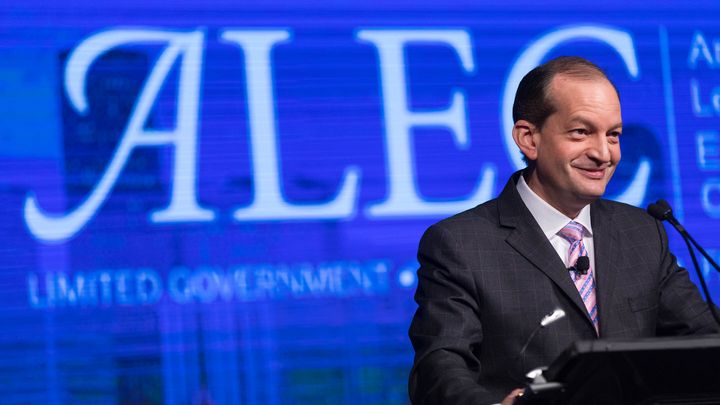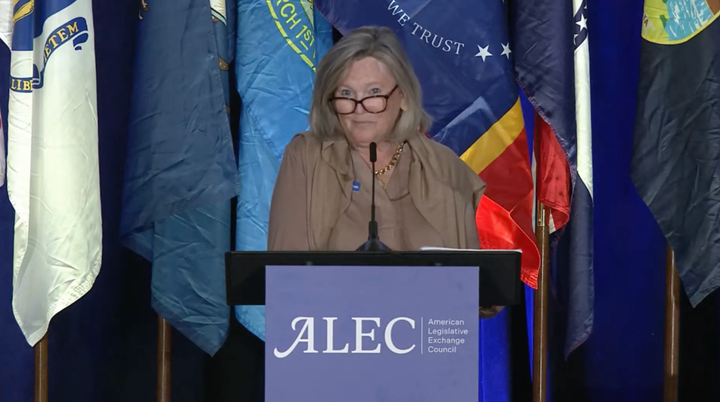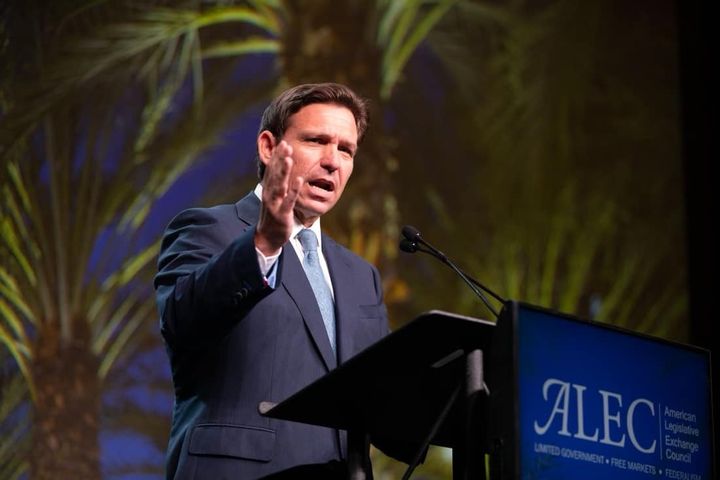Last week, nearly two hundred corporate executives endorsed a “statement on the purpose of a corporation” from the Business Roundtable, a trade group composed of executives of major U.S. corporations, promising to protect the environment, treat workers fairly, and respect the communities in which they do business. The statement, published on August 19, provides a new definition for the purpose of a corporation. Rather than serving only shareholders, corporations exist to “promote an economy that works for all Americans.”
But just days before the statement was released, a dozen of the companies whose executives signed it sent lobbyists to the American Legislative Exchange Council’s (ALEC) annual conference, a secretive meeting where the lobbyists worked with Republican lawmakers to promote policies meant to shore up the power of corporations beyond the reach of the democratic process.
At the meeting, held in Austin, Texas from August 14 to 16, lobbyists and legislators drafted and voted on model bills that the legislators will bring back to their states and introduce in their upcoming legislative sessions. The details of this year’s model bills are not fully disclosed, but the public agenda indicates that attendees worked on promoting deregulation of oil and gas fracking, gutting electronic data privacy laws, freeing toxic chemical producers for liability, promoting partisan gerrymandering, busting unions, and more.
The companies whose executives signed the Business Roundtable statement while also sending lobbyists to the ALEC meeting include Anthem (Blue Cross Blue Shield), Bayer AG, Chevron, Duke Energy, FedEx, Marathon Petroleum, McKesson, NRG Energy, Pfizer, United Parcel Service, USAA, and Vistra Energy, according to a list of attendees published by investigative news site Documented and reviewed by Sludge.
“ALEC lets corporations write state-level bills in secret that limit workers’ rights, protect corporate polluters, enable secret corporate election spending, and prop up the for-profit prison industry and gun manufacturers,” said Rachel Curley, Democracy Associate with Public Citizen’s Congress Watch division. “This is the exact opposite of what the CEOs who signed on to the Business Roundtable letter say they value.”
In the Business Roundtable , the CEOs pledged to “respect the people in our communities and protect the environment by embracing sustainable practices across our businesses.” Yet several of the session’s at the ALEC meeting focused on fighting environmental protections.
One proposal developed in a closed-door session takes aim at the Green New Deal, a resolution put forth by Rep. Alexandria Ocasio-Cortez (D-N.Y.) and Sen. Ed Markey (D-Mass.) that calls for a 10-year national mobilization to achieve net-zero greenhouse gas emissions, create millions of high-paying jobs, protet vulnerable communities, and secure the environment for generations to come. ALEC’s resolution denounces the Green New Deal as “socialist and anti-capitalist” and declares that America’s pursuit of clean energy be “technology neutral,” echoing calls for all-of-the-above energy policies that accommodates the continued burning of fossil fuels. Fossil fuel companies like Chevron and Marathon Petroleum that sent lobbyists to the ALEC meeting would likely be transitioned out of business if a plan like the Green New Deal were enacted.
The lobbyists and legislators at the meeting also discussed the “economic and societal impacts of fracking.” IN recent years, ALEC has pushed bills to preempt federal authority over fracking and ensure that fossil fuel companies do not have to disclose the chemicals they use in their fracking fluids. Another session focused on regulation of PFAS, a toxic chemical used in many materials and consumer products that has been found in the drinking water of communities across the country. On Twitter, ALEC has been critical of lawsuits against companies that produce PFAS chemicals, claiming that “science conflicts with the legal action.”
In the Business Roundtable statement, the CEOs also pledged to invest in their employees by “compensating them fairly and providing important benefits.” But over the years, ALEC has dedicated significant resources to weakening workers’ power to form unions in order to advocate for fair pay and benefits.
One model bill discussed at this year’s meeting is designed to make it more difficult for members of public unions to conduct union business like investigating grievances, conducting collective bargaining activities, and enforcing agreements by prohibiting them from being paid for the time they spend on such activities. Another bill ALEC has pushed requires union workers to hold a vote every two years on whether they want to continue being represented by their union. ALEC has also created a “public sector union legislative toolkit,” which is designed to help legislators weaken the power of unions in the wake of the Supreme Court’s 2018 Janus v. AFSCME decision declaring that workers can opt not to pay public-sector union fees while still benefiting from their unions’ negotiations. The toolkit presents a legal argument for how states can stop all payments to union members, because, it claims, “the entire premise that employees have opted into a union pre-Janus is null and void.”
Other sessions at ALEC’s annual meeting touched on the democratic process itself. The lobbyists and legislators met to strategize around gerrymandering ahead of the next round of redistricting in 2022. In sessions like “What is Redistricting and Why Must We Do It?” and “How to Survive Redistricting,” legislators were trained on legal issues by attorneys with extensive experience in the “demographic landscape and mapping process.”
One of the gerrymandering workshop leaders was Heritage Foundation fellow Hans Von Spakovsky, who, according to the Center for Media and Democracy, urged legislators to use citizen voting age population data for redistricting, leaving non-citizens and young people out of the map-drawing process. Spakovsky said at the session that his plan “may give an advantage to Republican legislators.”
The meeting participants also discussed a statement of principles on the benefits of the Electoral College and opposing the National Popular Vote Interstate Compact, a growing movement among states to award Electoral College votes to the winner of the national popular vote.
“These CEOs and all of corporate America need to be transparent about their attempts to influence our democracy and actually walk the walk on the values they claim to have,” Curley said. “Ultimately, we need Congress to make sure that they do.”



